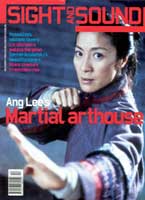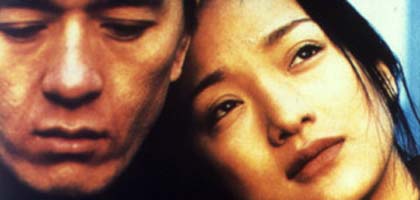
Mermaid's tale
Film of the Month: Suzhou River

Suzhou River's doubles and drifters create a watery take on Vertigo. By Lizzie Francke.
Writer-director Lou Ye's second film, a tale of amour fou set in modern-day Shanghai, opens with shots of the swirling Suzhou river from which it takes its name. As we float past the cluttered banks of the city, the unnamed - and unseen - videographer who narrates the film ponders the many secrets the river holds. As with the muddied waterways of Taipei in Tsai Ming-Liang's
Despite the gritty, almost documentary feel Lou Ye gives these opening moments, his film steers a different course from the downbeat realism that characterises the work of his Beijing Film Academy contemporaries Zhang Yuan (Beijing Bastards/Beijing Zazhong, 1993) and Wang Xiaoshuai (The Days/Dong-Chun De Rizi, 1993). Building the narrative from chance encounters and interconnected lives, Lou makes obvious nods to Wong Kai-Wai's Chungking Express/Chongqing Senlin. Stylistically the film also owes something to Wong's restless visual sensibility: jump cuts abound and director of photography Wang Yu's dextrous handheld camerawork snakes like the river itself. One of the most memorable images adroitly captures the mix of observational realism and lush romanticism: as the videographer tells of how the locals explain the disappearance of Moudan, we catch a glimpse of her, dressed as a mermaid, bathed in a pool of warm golden light, her tail sunk in the murky waters of the Suzhou. Meimei's mermaid - the persona she adopts for her nightclub act, complete with a long blonde wig and emerald-scaled tail - exists in an equally incongruous environment, the dingy drinking dive the Happy Tavern. At the beginning the videographer catches only a glimpse of the coquettish Meimei as she prepares for her act, but it's clear she has beguiled him, much as her mythical counterparts were said to drive men to distraction - and to their doom.
Lou's decision to use the figure of the mermaid - which isn't part of Chinese folklore - is characteristic of the global outlook of his sixth-generation film-making contemporaries. Similarly he markedly embraces what was presumably illicit cinema history by paying a clear stylistic debt to Alfred Hitchcock's Vertigo, the perennial favourite of cinéphile directors worldwide. The river, the bridge, the obsessive, haunted protagonist and the girl who might not be quite who she seems: this drifting reverie of a film shares elements that have figured in countless movies inspired by Hitchcock's 1958 masterpiece from Chris Marker's arthouse sci-fi La Jetée (1962) to Paul Verhoeven's glossy thriller Basic Instinct (1992). But Suzhou River is less a radically new spin on Hitchcock's film than a free-fall replay that revels in its lachrymose love story, as Mardar, like Vertigo's hero Scottie, falls for a woman who's seemingly the double of his lost love.
Much of the film is seen through the lens of the videographer - who admits to spending more time "observing" than working - and is accompanied by his pensive musings. The device brings to mind the first-person camerawork of Robert Montgomery's 1946 thriller Lady in the Lake, but whereas the subjective visual strategy in that movie was really only a noir novelty, here it deepens the dreamlike intensity and haunting, slippery sense of unreality. Narrating Mardar and Moudan's story, the videographer's voiceover often assumes a tentative, improvisory quality: against a reflection of Mardar lit by a flickering bulb, he hesitates before letting us into his backstory as if he's making it up; later, as Mardar and Moudan get to know one another, the narrative seems to stall, and the videographer asks: "What happens next?" ("Love, of course," is his answer, but he could just as honestly have added betrayal and death.)
So much of what we see is filtered through the videographer's lens that it's difficult to take things at face value. Mardar and Moudan's love story isn't exactly idealised - he betrays and kidnaps her - but it's more deeply felt and richly realised than the videographer's obsessive crush on Meimei. The videographer's relationship with Meimei might be effervescent, but the message underlying the narrative drift that carries Mardar and Moudan to their watery ends is hardly comforting: that true love is ever allusive and can at any point disappear into the darkness.
Ironically, given the hold they have over the videographer and Mardar, Meimei and Moudan are the least alluring aspects of Suzhou River. Neither is a true-blooded femme fatale in the noir tradition the film evokes; they're both a little too ditzy and prone to flighty behaviour, if not childlike. At various moments Moudan is seen toying with a mermaid doll as if to emphasise her girlish qualities. (At least Vertigo's Scottie fell for a grown-up woman.) But while the film is at its most irritating when we follow the lovelorn videographer's record of the pouting Meimei, the unsteady first-person point of view at least foregrounds the inherent voyeurism at play.
In the end, it's hard not to be swept up by the strong current of Suzhou River: a seductive and atmospheric conundrum that works pleasingly as an exercise in storytelling. The Chinese-box structure allows for multiple parallels, most obviously with the doubling of Meimei and Moudan, as the videographer latches on to - or for that matter invents - Madar's tale. Meanwhile these loved ones may be only echoes of another unseen desire: with this fresh piece of film-making from mainland China, Lou Ye swoons to the memory of Hitchcock.
